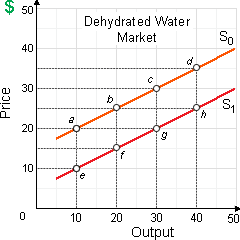Even though a drought decreases supply from S1 to S0, at each point along both of such supply curves, the supply of tanks of dehydrated water: (i) perfectly price elastic. (ii) relatively price elastic. (iii) unitarily price elastic. (iv) relatively price inelastic. (v) perfectly price inelastic.

Please guys help to solve this problem of Economics with some explanation.